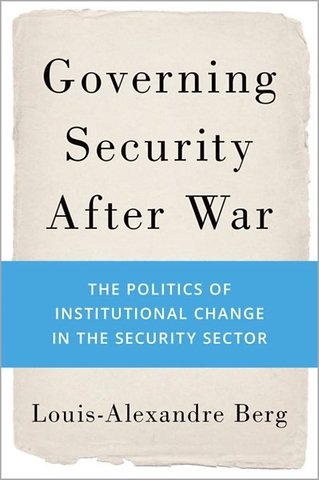Governing Security After War
The Politics of Institutional Change in the Security Sector
Gebonden Engels 2022 1e druk 9780197572382Samenvatting
Security assistance has become the largest component of international peacebuilding and stabilization efforts, and a primary tool for responding to civil war and insurgency. Donors and peacekeepers not only train and equip military and police forces, they also seek to overhaul their structure, management, and oversight. Yet, we know little about why these efforts succeed or fail.
Efforts to restructure security forces in Iraq, Libya, South Sudan, Timor-Leste, and theDemocratic Republic of Congo ended amidst factional fighting. Similar efforts in Liberia, Sierra Leone, El Salvador, Mozambique, and Bosnia and Herzegovina helped to transform security forces and underpin peace. What accounts for the mixed outcomes of efforts to restructure security forces aftercivil war? What is the role of external involvement on these outcomes? In Governing Security After War, Louis-Alexandre Berg examines the political dimensions of security governance through systematic, cross-country comparison.
Berg argues that the extent to which state policymakers adopt changes to the management and oversight of security forces depends on internal political dynamics, specifically the degree to which leaders need to consolidate power. The different political strategies leaders pursue, in turn, affect opportunities for external actors toinfluence institutional changes through means such as conditions on aid, norm diffusion, or day-to-day participation in decision-making. Drawing on an original dataset of security governance and field research in Liberia, Bosnia and Herzegovina, and Timor-Leste, as well as mini-case studies of Iraq, Afghanistan, South Sudan, and Somalia, Berg draws out novel implications that help explain the recurrence of civil war and the impact of foreign aid on peacebuilding.
Moreover, Berg provides practical recommendations for navigating the political challenges of institutional change in conflict-affected countries. Ultimately,Governing Security After War seeks to explain the success and failure of international assistance in war-torn countries and sheds light on the politics of peacebuilding.
Specificaties
Lezersrecensies
Inhoudsopgave
List of Tables
Acknowledgments
List of Abbreviations
Chapter 1. Introduction
Chapter 2. The Politics of Postwar Security Governance
Chapter 3. Strength in Vulnerability: Military and Police Restructuring in Liberia
Chapter 4. Politics of Fear: Police and Defense Reform in Bosnia and Herzegovina
Chapter 5. Influence of Riches: The Timor-Leste National Police
Chapter 6. Across Postwar Countries and Beyond: Statistical Analysis of Security Governance
Chapter 7. Conclusion
Appendix
Bibliography
Index
Anderen die dit boek kochten, kochten ook
Rubrieken
- advisering
- algemeen management
- coaching en trainen
- communicatie en media
- economie
- financieel management
- inkoop en logistiek
- internet en social media
- it-management / ict
- juridisch
- leiderschap
- marketing
- mens en maatschappij
- non-profit
- ondernemen
- organisatiekunde
- personal finance
- personeelsmanagement
- persoonlijke effectiviteit
- projectmanagement
- psychologie
- reclame en verkoop
- strategisch management
- verandermanagement
- werk en loopbaan






